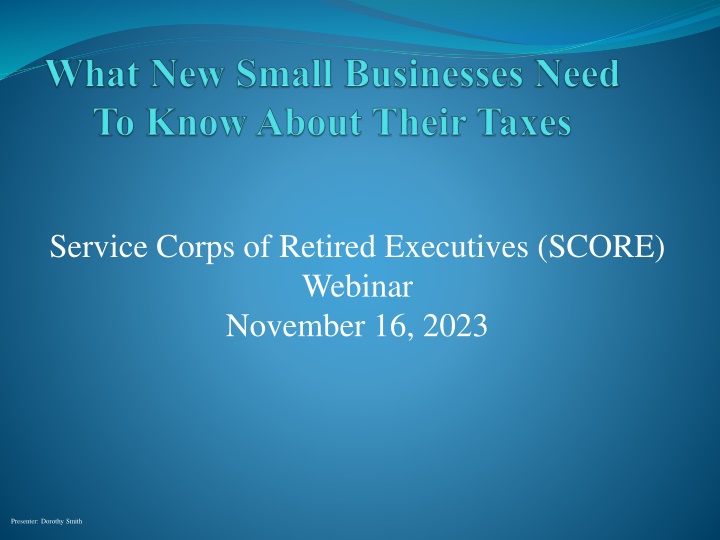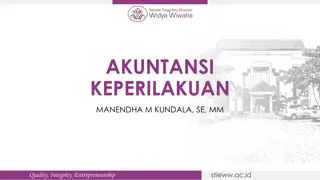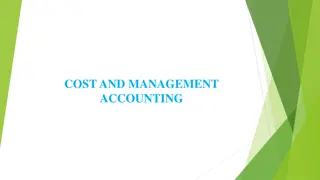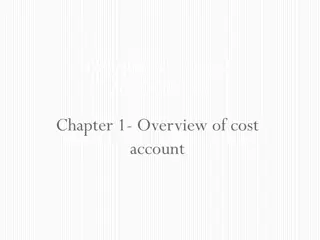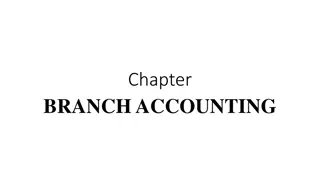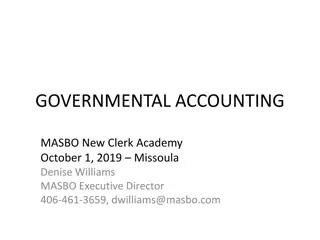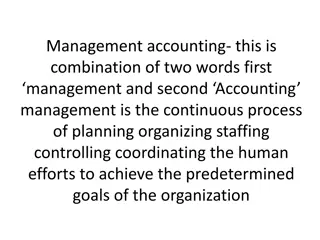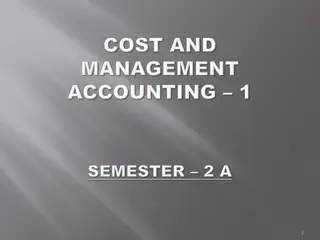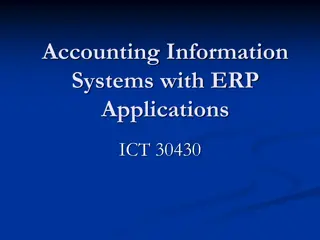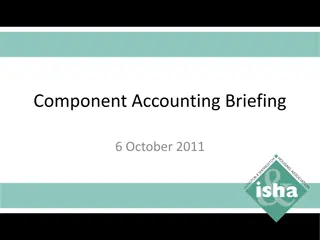History and Development of Accounting
Delve into the rich history of accounting, tracing its evolution from early civilizations like Chaldean Babylonian, Assyrian, Sumerian, Egyptian, Chinese, Greek, to the sophisticated systems introduced by Zenon in Greek Civilization and the role of government accounting in the Chinese Zhou Dynasty. Explore the significance of double-entry bookkeeping and the factors contributing to the development of accounting practices. Uncover how ancient civilizations laid the foundation for modern accounting principles, shaping present and future practices in this essential discipline.
Download Presentation

Please find below an Image/Link to download the presentation.
The content on the website is provided AS IS for your information and personal use only. It may not be sold, licensed, or shared on other websites without obtaining consent from the author.If you encounter any issues during the download, it is possible that the publisher has removed the file from their server.
You are allowed to download the files provided on this website for personal or commercial use, subject to the condition that they are used lawfully. All files are the property of their respective owners.
The content on the website is provided AS IS for your information and personal use only. It may not be sold, licensed, or shared on other websites without obtaining consent from the author.
E N D
Presentation Transcript
Service Corps of Retired Executives (SCORE) Webinar November 16, 2023 Presenter: Dorothy Smith
Disclaimer This presentation is provided solely for informational purposes and is not intended to constitute tax, legal, HR, or any other advice related to any specific situation. Presenter: Dorothy Smith
Topics of Discussion State of Tennessee Business Tax Updates Tax Filing Requirements Tax Deadline The IRS Definition of Expenses Common Deductions The Home Office Deduction (In more detail) Some IRS Recordkeeping Rules Presenter: Dorothy Smith
Tax Filing Requirements As a business owner, it is important to know that you have Annual Federal and State Tax filing requirements. Federal include: Income Taxes Payroll Taxes (if you have employees) Self Employment Taxes (Medicare and Social Security) Sole Owner or Single Member LLC Estimated (Quarterly)Taxes (if you owe $1,000 or more to the IRS). State include (vary by location), but in Tennessee: Business Taxes Sales Taxes (if you sell products) Franchise and Excise Taxes (for LLCs and Corporations) Annual Report (for LLCs and Corporations) All State Taxes Must be filed even if the business does not make any money Local include (vary by city and county), but in Tennessee Tangible Personal Property Tax Presenter: Dorothy Smith
Tax Filing Deadline The Federal Tax Filing Extended deadline was Monday, October 16th2023. If you have not filed your taxes; file as soon as possible If you have a balance due you will have to pay penalties and interest. The IRS will shut down Saturday, November 28, 2023 in preparation for Tax Filing Season 2023 Presenter: Dorothy Smith
IRS Definition of Expenses According to the IRS, a business expense must be both ordinary and necessary to be deductible. Ordinary: common and accepted in your industry. Necessary: helpful and appropriate for your trade or business. Presenter: Dorothy Smith
Common Deductions A list of expenses for businesses includes: Advertising or Marketing, Bank Fees, Continuing Education Insurance, Interest, Legal & Professional Fees Meals (limited to 50%), Office Supplies, Rent, Utilities Tax Preparation Fees, Taxes (Not Federal) & Licenses, Travel Wages, Other Expenses, etc Expenses for personal & business use: Cell Phone, Computer, Vehicle, Home Office , etc. Deduction is limited to business use only Presenter: Dorothy Smith
Home Office Deduction Pg 1 The home office deduction allows qualifying taxpayers to deduct certain home expenses on your tax return. Here are some things to help you understand if you qualify for the home office deduction Employees are not eligible to claim this deduction Available to homeowners and renters. Deductions include mortgage interest, insurance, utilities, repairs, maintenance, depreciation and rent. You must meet specific requirements to claim home expenses as a deduction; the deductible amount may be limited. Presenter: Dorothy Smith
Home Office Deduction Pg 2 The term "home" for purposes of this deduction: Includes a house, apartment, condominium, mobile home, boat or similar property. Structures on the property: unattached garage, studio, barn or greenhouse. Doesn't include any part of the property used exclusively as a hotel, motel, inn or similar business. There are two basic requirements for your home to qualify as a deduction: Exclusive use of a portion of the home for conducting business on a regular basis. The home must be your principal place of business. You can also meet this requirement if administrative or management activities are conducted at the home and there is no other location to perform these duties. If you conduct business outside of the home but also uses the home to conduct business may still qualify for a home office deduction. Expenses that relate to a separate structure not attached to the home will qualify for a home office deduction only if the structure is used exclusively and regularly for business. Presenter: Dorothy Smith
Home Office Deduction Pg 3 There are two methods used to calculate the home office deduction: The simplified method is $5 a square foot of the room used for business; maxed at 300 square feet and $1,500. Reduces the burden of recordkeeping; same rules apply Calculate: 100 sq ft *5 = 500 deduction The regular method, is based on the percentage of the home used for business Indirect expenses are based on percentage; direct expenses are deducted in full Depreciation is a part of the calculations using this method Calculation: Square footage of your home divided by the Square footage of the room used for business to get the percentage of business use 2500 Square footage of home /250 Square footage of the room= 10% - percentage Total expenses for the home is $5000 * 10% = $500 deduction Presenter: Dorothy Smith
Some IRS Recordkeeping Rules Everyone in business must keep records One of the first things you should do is open a business checking account in order to keep your personal and business accounts separate. It is also recommended that you choose a recordkeeping system that accurately and clearly shows your business income and expenses. In order to claim deductions, you must be able to prove certain elements of expenses Keep records such as sales slips, paid bills, invoices, receipts, deposit slips, canceled checks, etc. I also recommend keeping : bank statements, credit card statements, loan documents, etc. Presenter: Dorothy Smith
Key Take Away In order to avoid owing taxes at the end of the year, it is recommended that you pay your Estimated (Quarterly) Taxes. Setting up a simple Recordkeeping system will help you track your business's income and expenses. It is crucial to keep all documents that support business transactions. Filing and paying your taxes by April 15th can prevent interest and penalties: However, if you are unable to file on time, make sure to file an extension Keep in mind: Taxes not paid in full will result in the failure to pay penalty and interest ( unless you have a reasonable cause for not paying) My recommendation: Keep a copy of your tax return and all supporting documentation since the burden of proof lies with you as the business owner Presenter: Dorothy Smith Presenter: Dorothy Smith
Q & A Presenter: Dorothy Smith
